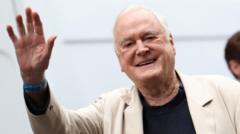Did John Cleese Just Make a 'Terrible' Joke About Welsh Fawlty Towers?

Published: 2025-11-15 19:00:12 | Category: wales
John Cleese, the legendary actor known for his role as Basil Fawlty in the iconic sitcom Fawlty Towers, recently reflected on a "terrible, terrible joke" he wrote about Wales in one of the show's episodes. Despite its short run of only 12 episodes, Fawlty Towers has remained a cornerstone of British comedy for the past 50 years. Cleese's comments highlight both the show's humorous legacy and the significant contributions of its director, John Howard Davies, to its success.
Last updated: 26 October 2023 (BST)
What’s happening now
In a recent interview with BBC Radio Wales, Cleese reminisced about the beloved sitcom and its enduring impact on British television. His comments come as fans celebrate the 50th anniversary of Fawlty Towers, which first aired in 1975. Cleese's reflection on the overlooked joke about a Welsh restaurant, "Leek House," offers a glimpse into the show's quirky humour and its ability to resonate with audiences even decades later.
Key takeaways
- John Cleese recalls a joke about Wales from Fawlty Towers that went unnoticed.
- The sitcom celebrates its 50th anniversary this year despite only having 12 episodes.
- John Howard Davies played a crucial role in the show's success.
Timeline: how we got here
Fawlty Towers debuted on 19 September 1975 and quickly became a cultural phenomenon. Below is a brief timeline highlighting key moments:
- 19 September 1975: Fawlty Towers premiered on BBC Two.
- 1975: The show concluded its first series, comprising six episodes.
- 1979: A second series of six episodes was aired, solidifying its status in comedy history.
- 2023: The 50th anniversary of Fawlty Towers is celebrated, with ongoing discussions about its legacy.
What’s new vs what’s known
New today/this week
Cleese's recent interview discusses a little-known joke about Wales and reflects on the contributions of John Howard Davies to the success of Fawlty Towers. These insights serve as a reminder of the show's lasting impact and the creative minds behind it.
What was already established
Fawlty Towers has long been recognised as one of the greatest British sitcoms. Cleese's character, Basil Fawlty, is known for his sarcastic and often rude demeanour, paired with the comedic chaos that ensues at his hotel. The show's limited run has only enhanced its reputation, allowing it to achieve cult status.
Impact for the UK
Consumers and households
Fawlty Towers continues to be a staple of British comedy, influencing generations of viewers and comedians alike. Its humour resonates with audiences, and it is often referenced in popular culture, reflecting British wit and charm.
Businesses and jobs
The legacy of Fawlty Towers has contributed to the tourism sector, particularly in areas associated with its filming. The show's continued popularity ensures that related businesses, such as memorabilia shops and themed events, thrive in the UK.
Policy and regulation
While Fawlty Towers does not directly influence UK policy, the continued celebration of such cultural icons reflects the importance of the creative arts in the UK. Creative industries are supported through various government initiatives, recognising their significance in the economy.
Numbers that matter
- 1975: The year Fawlty Towers first aired.
- 12: Total number of episodes across two series.
- 50: Years since the show's premiere in 2023.
- 6: Original episodes directed by John Howard Davies.
- 2: The number of roles Cleese played in the show: co-writer and lead actor.
Definitions and jargon buster
- Fawlty Towers: A British sitcom created by John Cleese and Connie Booth, centred around a dysfunctional hotel and its staff.
- BBC: The British Broadcasting Corporation, a public service broadcaster in the UK.
- Cult status: A term used to describe a work that has developed a dedicated fanbase despite its limited mainstream success.
How to think about the next steps
Near term (0–4 weeks)
Fans of Fawlty Towers can expect various retrospectives and discussions as the 50th anniversary unfolds. Broadcasts of the series may also be revisited, prompting new audiences to discover its charm.
Medium term (1–6 months)
As interest in Fawlty Towers continues, there may be potential for new related projects. Discussions around a revival or special episodes could emerge, reflecting the show's lasting appeal.
Signals to watch
- Any announcements regarding reunions or new material related to Fawlty Towers.
- Increased merchandise sales and themed events celebrating the show.
- Documentaries or specials on the legacy of British sitcoms.
Practical guidance
Do
- Rewatch Fawlty Towers to appreciate its humour and cultural impact.
- Engage with discussions and retrospectives on social media.
- Support local businesses that celebrate British comedy heritage.
Don’t
- Dismiss the show's relevance in contemporary discussions about comedy.
- Assume that its humour doesn't resonate with modern audiences.
- Forget to explore the contributions of its cast and crew.
Checklist
- Identify your favourite Fawlty Towers episode and why it resonates with you.
- Consider how the show's humour reflects societal norms of its time.
- Explore other works by John Cleese and Connie Booth.
- Attend any upcoming events or screenings related to the show.
- Read more about the impact of Fawlty Towers on British comedy.
Risks, caveats, and uncertainties
The discussion around Fawlty Towers and its legacy is evolving, with varying opinions on how its humour is perceived today. While it has maintained a strong fanbase, newer generations may have different sensitivities regarding its content. Additionally, there is uncertainty around potential revivals or adaptations, which could alter how the show is remembered.
Bottom line
Fawlty Towers remains a beloved piece of British television history, with its humour and characters continuing to resonate with audiences. As we celebrate its 50th anniversary, it serves as a reminder of the importance of comedy in reflecting and shaping cultural narratives. Whether through rewatching episodes or exploring its influence on modern comedy, there are many ways to appreciate its legacy.
FAQs
What is Fawlty Towers about?
Fawlty Towers is a British sitcom centred around the misadventures of Basil Fawlty, a rude and incompetent hotel owner, and his interactions with guests and staff.
Who created Fawlty Towers?
John Cleese co-created Fawlty Towers with his then-wife, Connie Booth, who also starred in the series.
Why has Fawlty Towers remained popular?
Fawlty Towers is recognised for its sharp wit, memorable characters, and its commentary on British society, which has allowed it to maintain cultural relevance over the decades.



